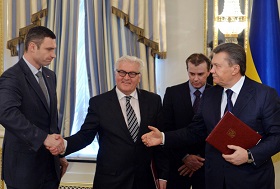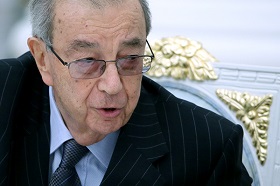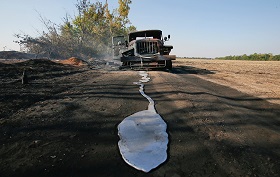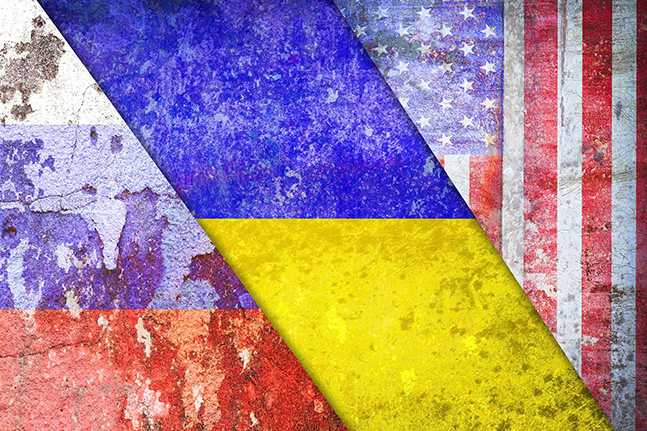The Ukrainian Crisis: Russia’s Official Position and How the Situation Can Be Resolved
Presidential Press Service
(no votes) |
(0 votes) |
PhD in Political Science, Independent expert
Over the course of the Ukrainian crisis the position of the Russian authorities has played an important, and at times decisive, role. This report will attempt to identify the reference points of Russia’s official view with regard to the development of the crisis. Critical analysis of this view has deliberately been ignored. In search for a resolution of the situation, the correctness of Russia’s official approaches is far less important than a consideration of what these approaches involve. The model of conflict resolution should comply with what the current Russian authorities believe the interests of the state are. This is one of the key criteria for the viability and success of a plan that is capable of bringing peace back to Ukraine.
Over the course of the Ukrainian crisis the position of the Russian authorities has played an important, and at times decisive, role. This report will attempt to identify the reference points of Russia’s official view with regard to the development of the crisis. Critical analysis of this view has deliberately been ignored. In search for a resolution of the situation, the correctness of Russia’s official approaches is far less important than a consideration of what these approaches involve. The model of conflict resolution should comply with what the current Russian authorities believe the interests of the state are. This is one of the key criteria for the viability and success of a plan that is capable of bringing peace back to Ukraine.
Background Information
According to the Constitution of the Russian Federation, the President is responsible for governing the country’s foreign policy [1]. For Vladimir Putin, politics in the post-Soviet space has always had a special significance, and not only because it is impossible to ignore the situation in neighboring countries. Back in 1994, the future president noted that when the Soviet Union collapsed, “Russia, in the interests of safety and peace in Europe, voluntarily gave up huge territories to former Soviet republics, including those territories that had historically always belonged to Russia.” [2] As a result, 25 million of Russians suddenly found themselves outside of their motherland. And Russia, according to Putin, “simply cannot allow, even in the interests of peace in Europe, these people to be left to their fate.” [3]
Later, as president, Putin stated that “the collapse of the Soviet Union was the greatest geopolitical catastrophe of the century. For the Russian people, it was a real drama. Tens of millions of our fellow citizens found themselves outside the Russian territory. The epidemic of disintegration spread to Russia itself.” [4] Essentially, Putin views the post-Soviet space as a fragmented “Russian World” that Russia has no right to forget [5]. First and foremost, this means the need for carrying out humanitarian work in this space – spreading the Russian language and knowledge of the Russian culture. But post-Soviet states may suffer crises, to which Russia cannot react indifferently. Regional crises have the potential to escalate beyond their original scale and, as a result, have a negative effect on global processes. This happened during the Russo-Georgian War of 2008, and it is happening now with the Ukrainian crisis.
The specifics of Ukrainian political development attracted the attention of leading political scientists. In his book The Clash of Civilizations, Samuel Huntington cites Ukraine’s electoral map following the 1994 presidential elections, drawing attention to the geographical split in the country separating the west, on the one hand, and the then-united political leanings of the centre and east of the country, on the other. He also talks about the likelihood of a split occurring in Ukraine along this fault line, pointing to the experience of Crimean separatism in 1992–94 [6].
For Vladimir Putin, cooperation with Ukraine at the political level began in January 2005 with a dialogue that took place between Putin and Leonid Kuchma who won those 1994 elections, In May 1997, during Boris Yeltsin’s presidency, Russia and Ukraine signed a Treaty of Friendship, Cooperation and Partnership that was ratified by Russia in March 1999 [7]. From 2001 to 2009, Russia’s ambassador to Ukraine was the political heavyweight, former Prime Minister Viktor Chernomyrdin (1993–1998). So, until 2004 Orange Revolution, relations between Russia and Ukraine were more or less the same as they had been during the Yeltsin era. Russia was fully prepared for the situation to continue along the same lines of trust and cooperation, declaring, at the request of Kuchma, its support for Viktor Yanukovych in the 2004 presidential elections. The events that unfolded after the second run-off election came as a complete surprise for Russia [8]. And it proved difficult for the Russian side to establish a dialogue with the eventual winner of the second run-off, Viktor Yushchenko. Viktor Yanukovych’s victory in the 2010 elections may have been welcomed in the Kremlin as a return to normal Russian-Ukrainian relations. Less than two months after being sworn in, Yanukovych signed the so-called Kharkiv Pact with then President Dmitry Medvedev resolving the issue of the Black Sea Fleet of the Russian Federation’s continued presence in Crimea and Ukraine receiving favourable conditions for obtaining gas. In February 2012, the Verkhovna Rada of Ukraine adopted the Law “On the Principles of the State Language Policy” establishing the conditions for the use of regional languages. This primarily affected the Russian-speaking population. We can assume that Moscow’s long-term plan with regard to Ukraine involved Yanukovych remaining in power until at least the January 2015 presidential elections, after which preliminary discussions could be opened about a possible successor if the current president’s popularity had declined to such a degree that re-election had become impossible.
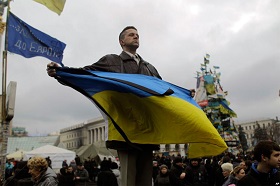
Chronicles of the Ukrainian crisis (in russian).
The worsening of the Euromaidan stand-off ultimately weakened Yanukovych’s position beyond repair. Nevertheless, the agreement signed between Yanukovych and the opposition on 21 February 2014 with the participation of international mediators offered a compromise. But there were no guarantees that the sides would keep to the agreement given their extreme distrust of each other. Yanukovych hastily abandoned his residence, and on 21 February the Verkhovna Rada considered possible to announce that he had “dismissed himself” from his presidential duties, a move that goes against the country’s constitution [9]. President Putin, meanwhile, insisted that Yanukovych’s “flight” was in fact a forced move to the region, and the seizure of the presidential administrative buildings was a violation of the agreement signed on 21 February 2014 [10].
The events of 22 February 2014 were seen by the Russian leadership as a coup, and apparently, the possibility of forming a constructive working relationship with Arseniy Yatsenyuk’s post-revolution government was practically dismissed out of hand. Russian officials used the term “the government of winners” to refer derogatively to Yatsenyuk’s cabinet as a means of contrasting it with a democratically elected government that would take into account the interests of diverse ideological and regional groups [11]. References in the official Russian rhetoric to the illegitimacy of the Kiev government evaporated following the Ukrainian presidential elections held on 25 May 2014. Despite numerous complaints about the conditions under which the elections were held, the results were recognized by the Russian side, clearing the way for a direct dialogue between the Russian and Ukrainian presidents. Numerous telephone conversations were followed by a two-hour private meeting in Minsk, where the forms of dialogue between the generals of staff, border services, energy workers and economic experts between the two countries were agreed [12].
Russia’s Priorities
In light of the use of violence by radical groups against opponents in Crimea, the Russian government felt justified in setting up a speedy referendum in the region, followed by the entry of the Republic of Crimea and Sevastopol into the Russian Federation. According to the official Russian position, these actions were in full compliance with the international law. Putin spoke in detail on this subject [13]. What was not in compliance with international law was the transfer of Crimea to the Ukrainian Soviet Socialist Republic from the Russian Soviet Federative Socialist Republic in 1954. At the same time, those who support the official position regularly make reference to Western countries repeatedly violating the foundations of international law whenever they deemed it necessary.
In addition to the linguistic and ethnic aspects connecting Russia and Crimea, President Putin also pointed to the importance of security issues. The composition of the new Ukrainian government suggests that one of its goals is to eventually join NATO. It is possible that missile defence systems could appear in the country [14]. Putin made quite clear how unacceptable he finds Ukraine’s participation – or at least participation of the Russian-speaking part of the country – in NATO at the Bucharest Summit back in April 2008 [15]. Among other things, taking the interests of all Ukrainian regions into account – something that Russia insists upon – implies that the eastern regions will block any initiatives to keep the country a unified state.
NATO is a military alliance. And, in Putin’s opinion, for geostrategic reasons, it must be prevented from moving closer towards Russian borders, no matter what its = intentions may be at any particular moment of time.
The European Union is an integration association, with whom cooperation may be mutually beneficial. At the EU-Russia Summit in January 2014, immediately before the decisive phase of the Ukrainian revolution took place, Vladimir Putin had proposed to discuss the prospects of a free trade zone between the European Union and the countries of the Customs Union, that is, the future Eurasian Economic Union. This is how the Russian leadership views the ideal model of the former Soviet states’ participation in the formation of a unified economic space from Lisbon to Vladivostok – by joining the Eurasian Union, which would protect their economies from competition from the European Union. This would then enable them to negotiate more favorable terms with the European Union, using the cumulative economic and political weight of the Eurasian countries.
Donbass
The Ukrainian crisis has been worsened by the armed conflict in Donbass, leading more and more politicians in Russian and Ukraine to think about the need for a speedy settlement, even if this is not on the most favorable terms. Formally, the Russian leadership considers what is happening to be a strictly Ukrainian matter. But that does not mean it is being neutral. Official statements are often severely critical of the actions of the Kiev authorities, while justifying the behavior of the rebels in Donbass. Government representatives continue to insist on a ceasefire in the conflict zone and a transition to negotiations, directing their appeals to Kiev. Nevertheless, in view of the radical statements made by the rebels themselves, who have declared the creation of independent “republics” and do not hide the support they receive from Russia, the official position of the Russian leadership with regard to goals of the rebel movement needs to be clarified. A measure of clarification can be found in Putin’s address “to the Novorossiya Home Guard” [16]. The president sees the rebels’ actions as successful and justified, insofar as they have undermined Kiev’s military operation, which represents a “mortal danger for the population of Donbass.” Additionally, when questioned about Russia’s so-called Russian “invasion” of Ukraine, Putin made it clear that the supposed aid his country was giving to the insurgents was of a purely technical nature. What is important is the insurgents cannot be defeated by military means, which is why negotiations are necessary [17].
Resolution
It would seem that a dramatic series of events that unfolded during the summer of 2014 fundamentally changed Russia’s view of the plan to resolve the Ukrainian crisis proposed on 17 March 2014 [18]. The main points of the plan are:
- To prepare a federal constitution to be adopted by referendum;
- To establish the neutral military and political status of Ukraine;
- To make Russian the second state language, and granting other minority languages the status of regional languages;
- To expand the jurisdiction of the regions;
- Following the approval of the constitution – to simultaneously hold elections for all national and regional authorities;
- To recognize Crimea as part of the Russian Federation;
- To get a guarantee from the European Union, Russia and the United States as to system of government, sovereignty, territorial integrity and neutrality of Ukraine’s military and political status.
Predictably, the plan caused resentment on the Ukrainian side. It is unlikely that the plan will be adopted in full, but some of its points may become key to a consensus decision. We are talking here about the status of languages; increasing the jurisdiction of the regions, the necessity of which has been raised in Kiev; and the establishment of the neutral military and political status of Ukraine, which a constant concern of the Russian leadership.
Experts have also made suggestions as to possible models to resolve the crisis, the most notable of which being the 24-point Boisto Agenda presented by a Russian-American group of highly qualified specialists [19]. This plan also refers to the non-aligned status of Ukraine and focuses on resolving peacekeeping issues in Donbass with the participation of the United Nations and the Organization for Security and Co-operation in Europe, as well as on economic issues. The Boisto Agenda has also been heavily criticized by those who support Kiev’s position [20].
Making proposals and then criticizing them are necessary steps along the way to eventually finding a compromise solution. We need to understand that neither side can hope to have all of its demands met. We cannot resolve the Ukrainian crisis in a matter of months, or possibly even years. But what needs to be achieved in the shortest time possible is the termination of violence, no matter where it comes from. Political discussions simply cannot be successful during times of war. The proposals made by the Boisto Group may go some way to ending the armed confrontation.
1. The Constitution of the Russian Federation, Article 86a.
2. Bergedorfer Gesprächskreis 101. Rußland und der Westen: Internationale Sicherheit und Reformpolitik, St. Petersburg, 1994. Protokoll, S. 38. http://www.koerber-stiftung.de/fileadmin/bg/PDFs/bnd_101_de.pdf (in German).
3. Ibid.
4. Address to the Federal Assembly of the Russian Federation. April 25, 2005. http://archive.kremlin.ru/appears/2005/04/25/1223_type63372type63374type82634_87049.shtml (in Russian).
5. On the concept of the “Russian World”, see, for example: Polegkyi O. Changes in Russian Foreign Policy Discourse and Concept of “Russian World”, PECOB’s Papers Series, No. 16, Oct. 2011.
6. Huntington S. The Clash of Civilizations and the Remaking of World Order. (1996) N.Y.: Free Press, 2002. P. 167.
7. Treaty of Friendship, Cooperation and Partnership between the Russian Federation and Ukraine. Kiev, 31 May 1997 (http://lawrussia.ru/texts/legal_836/doc836a409x894.htm) (in Russian).
8. International Youth Educational Forum Seliger 2014. President of the Russian Federation (http://www.kremlin.ru/news/46507) (in Russian).
9. Verkhovna Rada Announces Tanukovych’s “self-dismissal” and Sets Date for Early Presidential Election // Newsru.com. 22 February 2014 (http://www.newsru.com/world/22feb2014/radaelections.html) (in Russian).
10. Live Call-In with Vladimir Putin. 17 April 2014 (http://www.kremlin.ru/transcripts/20796) (in Russian).
11. Deputy Ministers of Foreign Affairs of the Russian Federation: Chauvinists enter Ukrainian Government of “Winners” // Ria.ru (http://ria.ru/world/20140302/997794760.html) (in Russian).
12. Working visit to Belarus. 27 August 2014 (http://news.kremlin.ru/news/46493) (in Russian).
13. Address by President of the Russian Federation. 18 March 2014 (http://kremlin.ru/news/20603) (in English).
14. Meeting Between the Heads of World News Agencies. St. Petersburg.
15. NATO Bloc Divided by Non-Aligned States // Kommersant. 7 April 2008.
16. President of the Russian Federation Vladimir Putin addresses the Novorossiya Home Guard. 29 August 2014.
17. What Happened Behind Closed Doors at the Minsk Summit? Interview with Vladimir Putin // Channel One. 31 August 2014 (http://www.1tv.ru/news/polit/266628) (in Russian).
18. Statement of the Ministry of Foreign Affairs of the Russian Federation on the Support Group for Ukraine. 17 March 2014 (http://www.mid.ru/brp_4.nsf/0/49766426492B6E9644257C9E0036B79A) (in Russian).
19. The Path to Diplomatic Settlement of the Ukrainian Crisis // Kommersant 26 August 2014 (http://www.kommersant.ru/doc/2553169) (in Russian).
20. Response to the Boisto Agenda // Kommersant 2 September 2014 (http://www.kommersant.ru/doc/2558547) (in Russian).
(no votes) |
(0 votes) |


